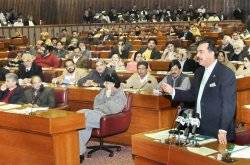Pakistan’s political crisis could take a major turn as the country’s supreme court takes on the civilian government on two fronts, both of which could see Yousuf Raza Gilani's legitimacy as prime minister challenged.
Monday marks the court’s deadline to Gilani’s government for reopening a stalled graft probe against President Asif Ali Zardari, which Gilani has refused, saying the president has immunity under the constitution.
A commission appointed by the court also resumed hearings into the so-called "Memogate" scandal, which has invoked the powerful army’s anger.
A secret memorandum allegedly written by Pakistan's former ambassador to the United States asked the US for help in thwarting a possible military coup in the aftermath of the US raid that killed al-Qaeda leader Osama bin Laden on Pakistan territory.
The recent tussle between civilian leaders and the generals has invoked fears of another coup against the elected government.
Civil-military distrust has plagued the nuclear-armed South Asian country for almost its entire existence, with the military ruling for more than half of its 64-year history.
Gilani has also called for a "show of confidence vote" in the parliament on Monday, which could provide a symbolic boost to the embattled civilian government.
Dismissal threat
The counsel for Mansoor Ijaz, the Pakistani-American businessman who served as the intermediary for the memo, told the Memogate commission on Monday morning that his client had been receiving "death threats", and requested to be given until January 25 to appear before the body, local media reported.
Tensions heightened last week over the scandal when Gilani criticized the armed forces for co-operating with the court’s probe into the affair without going through the proper channels in the civilian government.
Speaking at the parliament, after sacking his defense secretary, the prime minister said the standoff was nothing less than a choice between “democracy and dictatorship".
The prime minister’s comments followed a warning from the generals -who were infuriated by the memo - of possible "grievous consequences'' ahead. An army statement said the prime minister’s criticism of the army had been "divisive".
Last week, the court threatened to dismiss Zardari and Gilani if they continued to ignore its demands to reopen corruption probes against the president.
It ordered government representatives to appear in court on Monday to explain what they planned to do.
In 2007, the leaders of Zardari’s PPP were granted a controversial blanket amnesty over corruption charges under the National Reconciliation Ordinance (NRO).
The supreme court later struck down the NRO as being unconstitutional, but its rulings were never widely implemented, particularly when it came to pursuing legal cases against Zardari and other senior officials.
The PPP government has argued that the constitution gives a sitting president amnesty from prosecution.
PHOTO CAPTION
PM has asked for parliament's confidence, saying the country faces choice between democracy and dictatorship
Aljazeera


 Home
Home Discover Islam
Discover Islam Quran Recitations
Quran Recitations Lectures
Lectures
 Fatwa
Fatwa Articles
Articles Fiqh
Fiqh E-Books
E-Books Boys & Girls
Boys & Girls  Articles
Articles










